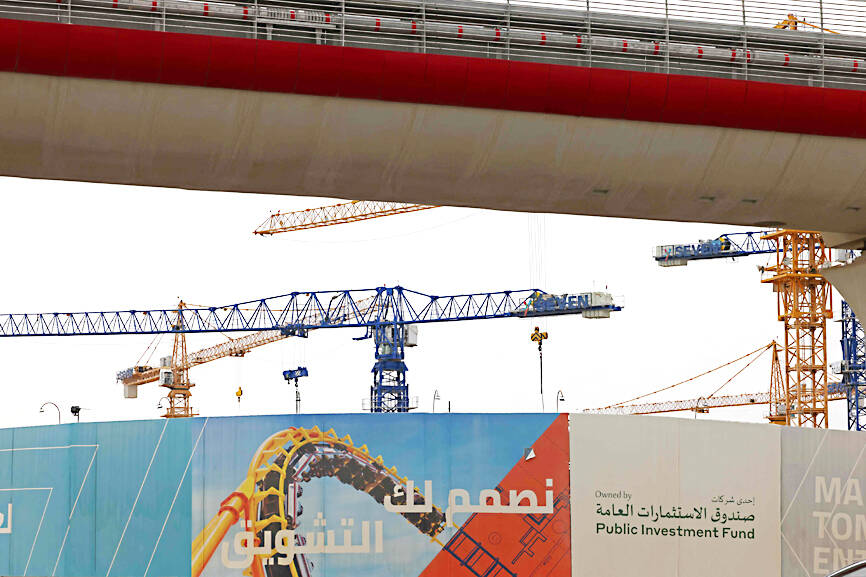Saudi Arabia’s Public Investment Fund (PIF) emerged as the world’s most active sovereign investor last year, boosting its deal activity even as most global peers, including GIC Pte and Temasek Holdings Pte, slashed spending.
PIF, as the Saudi Arabian fund is known, deployed US$31.6 billion last year, research consultancy Global SWF said.
That was higher than the US$20.7 billion it invested the previous year, an increase that contrasts with a wider trend, as globally state-owned investors deployed US$124.7 billion, about one-fifth less than a year earlier.

Photo: AFP
The declines were led by GIC, which cut the amount of capital deployed by 46 percent to US$19.9 billion and lost its spot as the world’s most active sovereign wealth fund for the first time in six years.
TemasekHoldings also reduced new investments by 53 percent to US$6.3 billion against a backdrop of volatile markets, which led the two Singapore-based investors to report worsening returns.
Much of GIC’s decline related to investments across developed markets, Global SWF said.
Singapore’s state investors continued to be active in emerging markets such as India, with deals including GIC’s US$1.4 billion joint venture with Brookfield India REIT and Temasek’s increased stake in Manipal Health Enterprises Pvt Ltd.
“Singaporean investors are being more cautious and we’ve seen that reflected in the numbers,” Global SWF said. “Gulf sovereign wealth funds have increased their domination of the global transaction activity, to the detriment of Singaporean and Canadian funds, and now represent almost 40 percent of all investment value deployed by sovereign investors.”
Overall, sovereign wealth funds controlled by the hydrocarbon-rich governments of Abu Dhabi, Saudi Arabia and Qatar took five spots on a list of the top 10 most active funds last year.
That trend could continue.
The governments of Bahrain, Kuwait, Oman, Saudi Arabia, Qatar and the United Arab Emirates are set to control about US$4.4 trillion in gross foreign assets by the end of this year, two-thirds of which is likely to be managed by sovereign wealth funds, a report issued by the Institute of International Finance last month said.
The PIF was behind the largest sovereign-backed deals last year, either directly or through its subsidiaries. These include its nearly US$5 billion acquisition of US gaming company Scopley Inc through Savvy Games Group and a US$3.6 billion acquisition of Standard Chartered PLC’s aviation leasing business through Avilease.
In September, the PIF also acquired the steel business of Sabic Basic Industries Corp in a US$3.3 billion deal that helped push the Saudi Arabian fund’s domestic investment to about 42 percent of total deployment last year.
“The variety of deals shows the unparalleled bandwidth and reach of PIF and its subsidiaries,” Global SWF said.

Semiconductor business between Taiwan and the US is a “win-win” model for both sides given the high level of complementarity, the government said yesterday responding to tariff threats from US President Donald Trump. Home to the world’s largest contract chipmaker, Taiwan Semiconductor Manufacturing Co (TSMC, 台積電), Taiwan is a key link in the global technology supply chain for companies such as Apple Inc and Nvidia Corp. Trump said on Monday he plans to impose tariffs on imported chips, pharmaceuticals and steel in an effort to get the producers to make them in the US. “Taiwan and the US semiconductor and other technology industries

SMALL AND EFFICIENT: The Chinese AI app’s initial success has spurred worries in the US that its tech giants’ massive AI spending needs re-evaluation, a market strategist said Chinese artificial intelligence (AI) start-up DeepSeek’s (深度求索) eponymous AI assistant rocketed to the top of Apple Inc’s iPhone download charts, stirring doubts in Silicon Valley about the strength of the US’ technological dominance. The app’s underlying AI model is widely seen as competitive with OpenAI and Meta Platforms Inc’s latest. Its claim that it cost much less to train and develop triggered share moves across Asia’s supply chain. Chinese tech firms linked to DeepSeek, such as Iflytek Co (科大訊飛), surged yesterday, while chipmaking tool makers like Advantest Corp slumped on the potential threat to demand for Nvidia Corp’s AI accelerators. US stock

The US Federal Reserve is expected to announce a pause in rate cuts on Wednesday, as policymakers look to continue tackling inflation under close and vocal scrutiny from US President Donald Trump. The Fed cut its key lending rate by a full percentage point in the final four months of last year and indicated it would move more cautiously going forward amid an uptick in inflation away from its long-term target of 2 percent. “I think they will do nothing, and I think they should do nothing,” Federal Reserve Bank of St Louis former president Jim Bullard said. “I think the

SUBSIDIES: The nominee for commerce secretary indicated the Trump administration wants to put its stamp on the plan, but not unravel it entirely US President Donald Trump’s pick to lead the agency in charge of a US$52 billion semiconductor subsidy program declined to give it unqualified support, raising questions about the disbursement of funds to companies like Intel Corp and Taiwan Semiconductor Manufacturing Co (台積電). “I can’t say that I can honor something I haven’t read,” Howard Lutnick, Trump’s nominee for commerce secretary, said of the binding CHIPS and Science Act awards in a confirmation hearing on Wednesday. “To the extent monies have been disbursed, I would commit to rigorously enforcing documents that have been signed by those companies to make sure we get